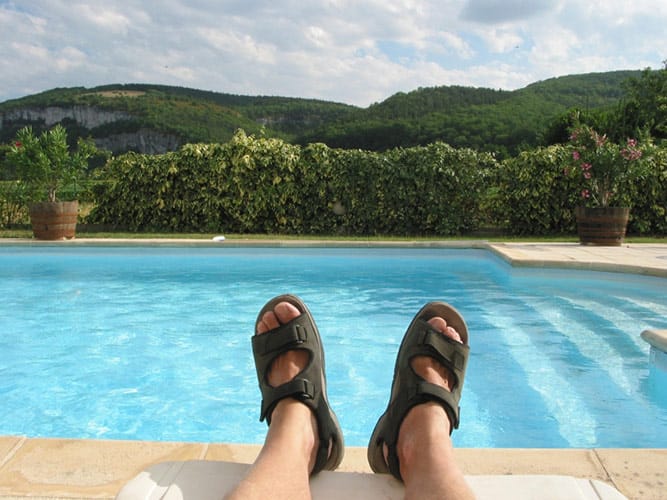France is a popular place for Brits to relocate, especially once they’ve passed the age of retirement. With the promise of gourmet food, charming historic villages, affordable living costs, access to great healthcare and close proximity to the UK, it’s a tough opportunity to pass up. Countryside settings with year-round sunshine are among the most popular regions for retirees, as are the Alps with its reliable snowfall, Bordeaux’s wine country and the coastal towns along the Cote d’Azur. Keep these considerations in mind if you’re planning to retire in France.
Table of Contents
Cost of Living
In general, the cost of living in France is approximately 5% higher than that in the UK. However, there are certain areas where the cost of living favors French residents. Petrol is less expensive, for example, and while food costs more, alcohol costs less, both in bars and for purchase in stores. When it comes to utility bills and the basic costs of maintaining a home, they’re about the same as in the UK. If you’re going to renovate your French property, consider driving to the UK to purchase materials, which are much less costly there. Large appliances like dishwashers and washing machines often cost less in the UK, too.
Expat Community
There isn’t a large, concentrated British expat community in France, which means that new residents have to put in extra work to assimilate and make friends. Learning the language can help with this – when French locals see that you’re trying to fit in, they’ll be more likely to invite you into their social circle. Plus, by learning the language, you can participate in local events and activities, communicate when you need help and find it easier to strike up small talk when you’re running errands.
Inheritance Plans and Wills
So long as you have an inheritance plan and will that are up-to-date, you won’t need to have a French one drawn up. If you don’t have these documents, though, you’ll want to pay close attention to the inheritance plan specifically, because the inheritance system is quite different in France than in the UK. In France, inheritance belongs to the entire family of the deceased person, not just to the surviving spouse. This means that your children will automatically get a portion of the inheritance. Seek legal advice regarding your inheritance plan before you become a resident of France, especially if you’re divorced, unmarried or in a civil partnership.
Income and Property Tax
Upon moving to France after retirement, you’ll be taxed as a French resident. You’ll have to pay income tax on your worldwide income, which includes your private or state pension; income from rentals or investments; and interest on your savings. You’ll also have to pay tax on other income streams, such as a business you run in the UK.
You’ll also be required to pay two different types of property tax: the Taxed Habitation and the Taxe Fonciere. The Taxed Habitation is similar to the Council Tax in the UK and it will vary based on where you live. The Taxe Fonciere is for property owners based on the value of your home.
Pension Transfers
Many retirees take their pension as a lump sum and transfer it to their French bank account all at once. However, you can be taxed up to 14% by doing this. Speak with a professional about the best way to move your money and how to reduce your tax bill. While you can have your UK pension automatically paid into your French bank account, it may work in your favor to have it paid into your UK account and then wait to transfer it based on a better exchange rate. Whenever you transfer money of any kind, you want to make sure that the exchange rate is in your favor.
Healthcare
France has an excellent healthcare system and many French residents have two or three health insurance plans to ensure they’re covered in a variety of ways. While UK residents will be familiar with some of the healthcare system’s characteristics, one main difference to know ahead of time is that you’ll be charged a flat fee per doctor and dentist visit. When it comes to accident and emergency care, many services are free, but you will be charged if you need specialty care. Often, you’ll have as much as 70% of the cost reimbursed by insurance. If the condition requires expensive or long-term treatment, it’s possible you’ll be reimbursed the full amount. Note that in addition to income tax, you may have to pay social charges for healthcare, but retirees often get a reduced rate.
Early Retirement
If you’re going to retire early – before the official retirement age of your home country – you may face higher taxes and healthcare prices in France because you’re considered to still be of working age. Before moving to France, speak with a tax professional who can help you plan for these extra charges.
Travel Considerations
When relocating to France, determine how close you want to be to major routes of transportation, like major highways or airports. You may be used to traveling to and from the UK by car within one day, but if you’re moving to a secluded countryside village, this can be challenging. Determine how much access you need to motorways and airports, then choose a location that fits your needs. When it comes to getting around within France, cars are much more affordable in the UK, so many UK residents opt to bring their car with them or buy one in the UK before moving. After six months of living in France, you’ll need to register your vehicle with the French authorities.
HOMEHUNTS estate agents are able to help you select luxury French property based on your specific search criteria. Use the search feature above to browse our selection of luxury homes. You can also speak directly to one of our consultants by calling +33 (0)970 44 66 43.




